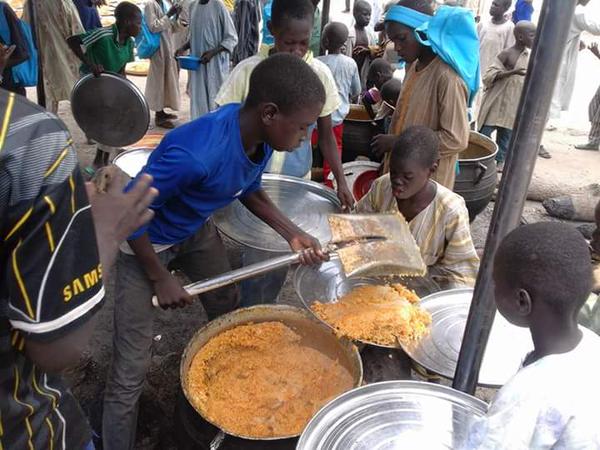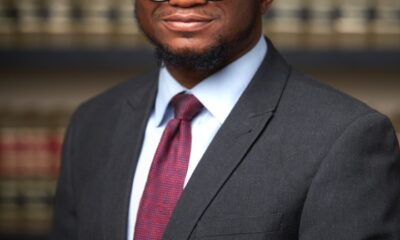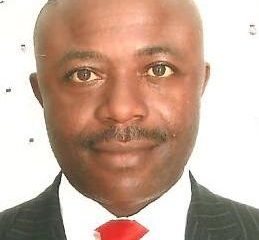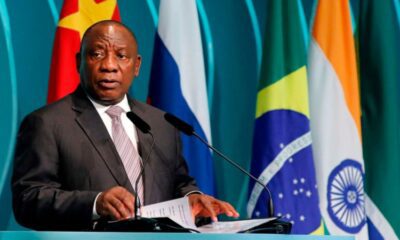Agriculture
The Neglected Aliens of the Motherland -By Afeso Albert Akanbi


Starved children at the Borno State IDP Camp
I was privileged to attend the 2016 Children’s Day party that was organised by the Paulash Community Development Initiative (PCDI), at the Kutchingworo Internally Displaced Persons (IDP) Camp in Abuja. Despite the enthusiasm with which the over 1500 kids in the camp received us, nothing detracted from the palpable suffering that was etched on their faces and the fact that they’ve been witnesses to horrors in their relatively young lives. Much as our team pretended that all was well, nothing concealed the fact that these kids, like many others elsewhere in this country, remained the neglected aliens in their own home. This visit gave me a vivid firsthand picture of the sort of poverty, squalor and degradation that is the reality of life in an average Nigeria IDP camp.
With horrid images of this visit still fresh in my memory, I woke up on Tuesday January 17 like countless Nigerians to the disheartening news of a military plane that had mistakenly dropped a bomb inside the well-defined Rann IDP camp in Kala-balge LGA in Borno State. Scores, including foreign aid workers, were killed and many more injured. Even though I support the call for a probe of this tragedy, I believe if anything, this disaster should throw up a robust debate on the conditions in the various IDP camps in Nigeria and what needs to be done to ameliorate the sufferings of displaced persons.
According to the National Emergency Management Agency (NEMA) and Internal Displacement Monitoring centre (IDMC), there are over 2.1 million kids below the age of 14 living in the various IDP camps scattered across northern Nigeria. This is not considering the fact that Nigeria still ranks as the African country with the highest number of ‘out of school’ kids, ‘child witches’ (those unfortunate souls who are still being maimed and killed in Akwa Ibom State as we speak), child labourers, street hawkers, child brides (a common occurrence in northern Nigeria), and so on.
The questions I think every thinking Nigerian should be asking is what are these kids still doing in the IDP camps? Assuming there are justifiable reasons why, under which conditions are they living? We are told Sambisa has fallen, so didn’t the air force man who dropped the bomb he have the proper coordinates of his supposed target? And what exactly is the House of Representatives Committee on IDP doing about the colossal fraud, diversion of funds and outright stealing and selling of materials meant for displaced persons, currently going on in these camps? What is President Buhari doing to ensure that this IDP issue is put behind us once and for all, and to guarantee the speedy return of these kids home? Because, whether we like it or not, it is one thing to be winning the war against terror, it is another thing to look after the victims of the war.
The fact that these kids are alive, in the first place, is a miracle that calls for reflection on our part because many of their peers were wiped out alongside their families. For example, in Kutchingworo I met one Mary, a girl of 12, who was said to have hid herself in the bush in Bauchi State for two days, before trekking from Bauchi to Jos! Her entire family was said to have been wiped out by Boko Haram.
In fact, any child you find today in any of the IDP camps must have tales of horror etched into the very fabric of his soul, and must have lost a loved one or even his entire family, and must have survived untold suffering and fear. And to know that these kids continue to face neglect from society, coupled with the recently ‘misfired’ bombing is simply unbearable. The truth is that none of these kids should be living in any of these IPD camps in the first instance. This is because none of them asked to be born. In fact, many of them were not even conceived by the time this evil we call Boko Haram befell us.
I put the blame of their suffering squarely at the doorstep of our politicians. They are the ones who not only set Boko Haram loose on us, but also set these kids on the pathetic path that has led to these IDP camps. Therefore, they are the ones who must have a re-think and do everything within their powers to bring these kids back to the normal life they were used to before their displacement, resettle and properly care for them, and see to it that those who caused them this pain are brought to justice.
The official manipulation of religion by various governments in this country, which has continued unabated over the years, asides being the root cause of these unwarranted deaths and the bane of our existence as a people, must stop. To think that we are yet to come out of the shock of the southern Kaduna killings and then this tragedy, is really depressing and totally unacceptable.
Whereas it is stipulated in our Constitution that the State shall not adopt any official religion, we have seen governments at all levels subtly adopting either the Islamic or Christian religions in their various domains. During his regime, General Babangida, for example, surreptitiously registered Nigeria as a member of the Organisation of Islamic Cooperation, built a mosque in the Presidential villa and appointed an Imam to man it. Similarly, when Chief Obasanjo came to power, he erected a chapel in the villa and appointed a chaplain to manage it.
Sharia Law was introduced in Zamfara State in 2000 and since then, not less than 15 northern states have followed suit. Even though this constituted a clear violation of our constitution, the then administration of Chief Obasanjo decided not to approach the court to test it constitutional validity.
Henceforth, many misguided Nigerians, believing the country had become an Islamic state, set up private militias to promote the policy of these state governments. This resulted in violent religious clashes that have become part of our national reality up until recently, as we saw in southern Kaduna. Over the years, thousands have been massacred and many more left homeless in these ethno-religious clashes. Who can deny today that this sort of religious manipulation were not part of the root cause of the cankerworm of terrorism in this country, a thing which is the remote cause of the Rann IDP camp disaster?
In 2011, President Jonathan set up a Panel of Inquiry to investigate the insurgency in the North-East. In a painstaking investigation, the Panel traced the genesis of Boko Haram and other private militias to politicians. But up till this moment, I am yet to see any top ranking politician held accountable for this evil, even though we know names have been mentioned linking certain people to it. We also see today the subtle refusal of access to the returned Chibok girls and inability of investigators to thoroughly scrutinise their testimonies.
Our politicians are responsible for the rise of Boko Haram, the displacement of these kids, and thus should be blamed for the Rann IDP camp disaster. This disaster must be investigated with a view to preventing a reoccurrence and it is high time someone is held accountable for the root cause of terrorism and the corruption that has led to the continued suffering of displaced persons.
Even if the government finally wins the battle against insurgency, I doubt if violence in our country will go away easily because none of us can predict what path the neglected persons will tow if we do not make conscious efforts to look after them. A child exposed to persistent fear due to frequent attacks, orphaned in the prison-like confines of these IDP camps with little or no care and support from society and government, and who then wakes up to find that a ‘misfired’ bomb has claimed his peers, will only give in to anger and depression. Such a child may develop little or no empathy and terrorist groups take advantage of such vulnerability in recruiting new and loyal members.
Andrei Lankov once said; “To not have your suffering recognised is an almost unbearable form of violence.” It is time for us to take notice of these kids, recognise that they are our children and children everywhere remain the hope of any nation. We owe it to them to punish those who set them on this path in the first place, no matter how highly placed. Because, a country’s greatness is not measured by how she treats its elites but by how she cares for the most vulnerable.”
Afeso Albert Akanbi is an author, researcher and NASRDA staff. He has three novels, a number of short stories and articles to his credit.




















